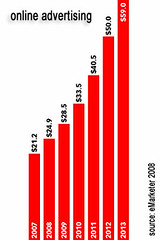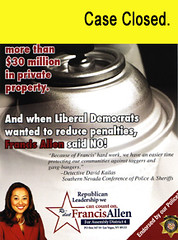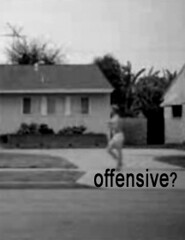Despite some bullish interruptions that online advertising is exempt from economic pressures, eMarketer has scaled back its estimates for online marketing. The firm adjusted its online advertising forecast for 2008 from $25.9 billion to $24.9 billion, and social network advertising from $1.6 billion to $1.4 million.
However, it’s hard to jump on the doom and gloom bandwagon based on this adjustment and Google's failure to meet analyst projections.
Online advertising is still projected to be up $3.7 billion from 2007, representing a 17 percent increase in online advertising revenue. Google still demonstrated a 35 percent increase in profits during the second quarter.
In other words, online advertising is growing while other media continues to be earmarked for additional cuts. Traditionally, newspapers have been the hardest hit along with network radio.
In looking at all the stories, companies might consider shooting for the middle. Personally, I would never develop a marketing strategy based on media trends over the media’s ability to meet the communication goals of a company. So in some ways, economic pressures help marketers because it increases a demand for accountability online and off. Blind benefits are not enough.
For example, one recent Web site project we completed for a start-up community relations firm had two primary functions — to summarize the full scope of service after meeting prospective clients and to prompt calls from prospective clients after being found on the Web. Long term, the consulting company will employ a blog and other social media tools to expand its presence online and open more channels for two-way communication.
As the program expands, targeted print ads and online advertisements can assist in driving traffic to the blog. While this is only a portion of their plan, none of it follows industry trends as much as intent. And each step has easily measured goals and objectives, which we think is important in demonstrating tangible value.

However, it’s hard to jump on the doom and gloom bandwagon based on this adjustment and Google's failure to meet analyst projections.
Online advertising is still projected to be up $3.7 billion from 2007, representing a 17 percent increase in online advertising revenue. Google still demonstrated a 35 percent increase in profits during the second quarter.
In other words, online advertising is growing while other media continues to be earmarked for additional cuts. Traditionally, newspapers have been the hardest hit along with network radio.
In looking at all the stories, companies might consider shooting for the middle. Personally, I would never develop a marketing strategy based on media trends over the media’s ability to meet the communication goals of a company. So in some ways, economic pressures help marketers because it increases a demand for accountability online and off. Blind benefits are not enough.
For example, one recent Web site project we completed for a start-up community relations firm had two primary functions — to summarize the full scope of service after meeting prospective clients and to prompt calls from prospective clients after being found on the Web. Long term, the consulting company will employ a blog and other social media tools to expand its presence online and open more channels for two-way communication.
As the program expands, targeted print ads and online advertisements can assist in driving traffic to the blog. While this is only a portion of their plan, none of it follows industry trends as much as intent. And each step has easily measured goals and objectives, which we think is important in demonstrating tangible value.






















